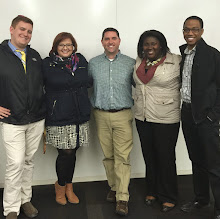
Pictured above: During a field study expodition to Milwaukee, WI and Marquette University's Center for Teaching and Learning, Dr. Green visits with graduate students in his Curriculum Development in Higher Education course.
Developed three graduate courses in the M.Ed. Higher Education Program, School of Education, Loyola University Chicago
- ELPS 429 High Impact Learning: Experiential Learning in Theory and Practice in Higher Education
- ELPS 430 Curriculum Development in Higher Education
- ELPS 431 Evaluation in Higher Education
Evidence from Student Evaluations:
- "Patrick is a wonderful professor! He did a great job creating a curriculum that modeled what we were learning in class. I especially loved the opportunity to create curricular plans for a real-world setting. My only critique is that I would have liked to see more critical perspectives (e.g. critical service-learning) earlier on in the class, not added-on at the end."
- "Patrick Green's passion for curriculum design, significant learning and experiential learning is contagious. He practices what he teaches and ensures that each class has a variety of learning activities and educative assessment activities. He's incredibly deliberate in the way he leads the class, and by incorporating a service-based experiential learning project with MU, he ensures we practice what he teaches. I had little knowledge of curriculum and instruction research or theories going into this course, but after taking it, I feel confident in developing course curriculum and in my ability to conduct further research for my professional growth. I'd gladly take more classes with him as the instructor. He clearly finds joy in working with students, and his capacity to support the development of graduate students is evident."
- "Thank you for an outstanding learning experience! This has been one of the best courses I have ever taken. Not only did I learn a great deal, but I thoroughly enjoyed this course and know the learning will stick with me. Patrick, you practice what you preach in so many ways and the impact truly shows. Thank you."
Learning to apply course material (to improve thinking, problem solving, and decisions) RATING - 4.8 /5
Gaining a basic understanding of the subject (e.g., factual knowledge, methods, principles, generalizations, theories) RATING - 5 / 5
Learning to apply knowledge and skills to benefit others or serve the public good RATING - 5 / 5
Overall, I rate this instructor an excellent teacher. RATING 5 / 5
Overall, I rate this course as excellent. RATING 5 / 5



Pictured above: During the last class, the graduate students of ELPS 430 Curriculum Development in Higher Education gathered to take a picture to celebrate their accomplishments!

